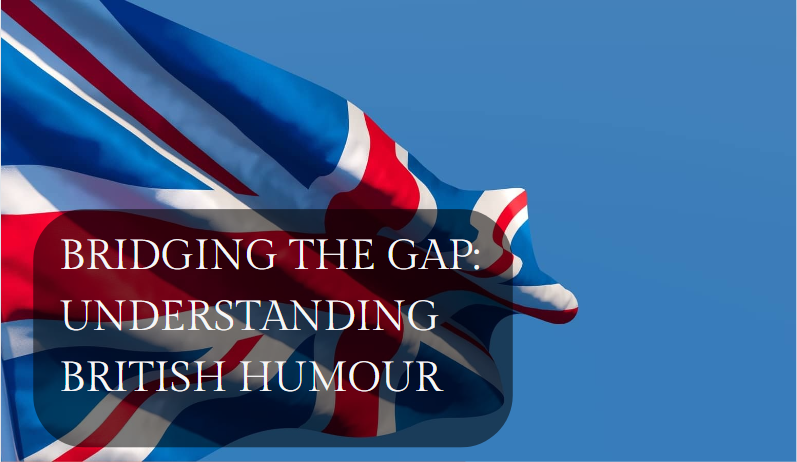UK Self-Sponsorship Visa Requirements
A self-sponsorship visa allows individuals to move to t...

What is considered hilarious in your country might not even raise a smile in another, just as what is seen as provocative or offensive can vary dramatically across cultures. That’s why you need to understand the humour gap before making the exciting move to another country. This article aims to provide insight into British humour, highlighting the unique differences and ensuring that you adapt to society seamlessly. Let’s dive in!
According to the Oxford Dictionary, humour is the quality of being amusing or comic, especially as expressed in literature or speech. This means, the tendency to promote laughter and amusement, either in the form of jokes, stories, cartoons, or any other form is referred to as humour.
Humour plays a significant role in societies, helping people interact and build relationships with one another. However, it’s societal-dependent, meaning it reflects different values, norms, and styles in different societies. For example, the British humour and the Nigerian humour both have distinct characteristics.
Read Also: British Workplace: Know The Cultural Nuances in the UK
British humour is characterised by several unique features including irony, sarcasm, understatement and wit. Understanding these features is essential for the following reasons:
Understanding British humour is crucial in connecting with people in the society. Humour comes up everywhere in the British community if you don’t understand it, you may find every piece provoking. Therefore, to integrate into the society, you must understand the humour around you.
Most entertaining activities, including TV shows, stand-up comedy, and so on, are all rooted in humour. If you are well acquainted with the country’s sense of humour, you won’t take offence at whatever you hear or see; rather, you’ll find yourself laughing along.
Read Also: British Culture: How To Adapt As An International Student
Humour is an integral part of communication in the UK, having its way to everyday interaction. Understanding it is essential to become fluent in communication. Beyond this, it is also vital in writing, as it helps you to write and communicate through chats, text, etc.
Both Nigerian and British humour often draw on relatable, everyday experiences in order to amuse the audience, however, there are significant differences. British humour is often drawn from sarcasm, irony, self-deprecation and understatement. On the other hand, Nigerian humour relies on, storytelling and exaggeration.
British humour uses the satirical style to ridicule or criticise people and politics. Many media, including comedy shows in the UK, use this style of humour to expose flaws. A notable comedy show and TV show that uses this style is Charlie Brooker’s “Weekly Wipe” and “The Simpsons,” respectively.
A witty statement is a blend of dry humour that involves using words and ideas to create humour in a quick and inventive way. This style of humour often results in amusing the audience. An example of a witty statement is “You are not known to say things that will cause us to Google search.”
Read Also: Thriving in a Multicultural Workplace: Tips for Skilled Expatriates
These styles are very common in the UK. It involves saying one thing but means the opposite. For example, saying “You are the brilliant one among us” to a classmate who is poor academically. Or saying “If you keep eating like this, you’ll surely lose weight” to someone who is a glutton and needs to go dieting.
Banter refers to friendly play. This style of humour mostly happens between friends, where they tease each other in order to keep the conversation ongoing.
British humour often draws from dark, real-life, or everyday experiences. This style of humour involves making jokes or comedy out of distressing and painful subjects, such as suffering, death, physical challenges, and more. It often provokes strong reactions, especially from those directly involved, but it serves as a unique way to find laughter amidst life’s hardships.
This is when people make fun of themselves with the aim of making the audience laugh. It involves making jokes out of personal flaws, mistakes, and shortcomings in a humorous way. Here is an example of self-deprecation: “I told my friends I was going to start a diet, but then I realized I have the willpower of a chocolate chip cookie at a bake sale.”
Read Also: Healthcare in the UK: A Beginner’s Guide
Understanding British humour is a delightful journey that not only offers insights into British culture but also enhances social interactions. By recognizing different humour styles, appreciating cultural references, and navigating language nuances, you can fully enjoy and participate in British comedic traditions.
British humour is known for its wit, sarcasm, and irony. It often involves making jokes out of serious situations, using understatement, self-deprecation and so on.
Yes, humour is the key element that makes comedy funny. A comedian aims to provoke laughter and entertain an audience, and humour jokes can do just that.
British humour is diverse and can include various styles such as:
Read Also: Important Tips To Verify Nigerian Police Report in the UK
Read Also: Work-Life Balance: A Guide for Skilled Professionals in the UK
2 Comments